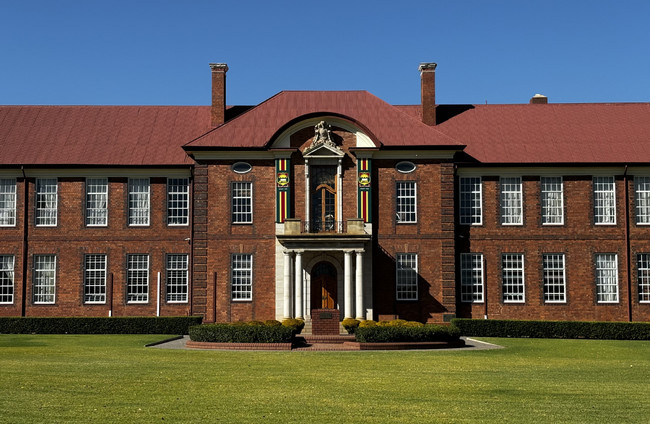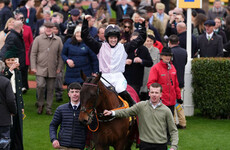IT’S 11AM ON the Friday morning before the Springboks play Ireland in Loftus Versfeld and across the road at Afrikaanse Hoër Seunskool, the Blue Bulls have just finished a session on the school’s main pitch.
The Bulls are getting ready for a Currie Cup game and with Loftus unavailable, they only have to walk 100 metres for a new training ground in Pretoria.
An hour later, the same pitch is being converted into a temporary car park ahead of a busy day of braais on Springboks game day, with thousands of people gathering in the school to eat, drink, and chat rugby in the build-up to the Test.
Leinster trained here when they visited Pretoria for their URC semi-final against the Bulls in June, Jacques Nienaber knowing all about the history at the school.
Rugby is at the heart of Afrikaanse Hoër Seunskool, which is known as ‘Affies’ in South Africa. The school is famous for producing 11 Springboks so far. More than 40 active professional players came through Affies.
It seems as if every corridor in the school of around 1,400 students is lined with photos of rugby teams. There’s RG Snyman on one wall, Fourie du Preez on another. Pierre Spies and Wynand Olivier are among Affies’ Springboks, while the school produced Scotland prop Pierre Schoeman and ex-Ireland lock Quinn Roux.
Former Munster boss Johann van Graan is among its alumni, as is the IRFU’s national talent ID manager Wayne Mitchell. The Affies network extends all over the rugby world.
It’s a public boys’ school where everything is taught and coached in the Afrikaans language. There is major pride in their heritage. Rugby plays a big role in Afrikaaners’ lives and Affies is a vivid illustration of that.
Two former Affies students, 35-year-old twin brothers Niell and Ruan Jacobs, now head up the school’s rugby programme. Ruan is the head of rugby and coaches the first XV and Niell is the head of rugby coaching and U16s coach. They had professional playing careers with the Cheetahs, Leopards, and Bulldogs in South Africa before moving into coaching.
The Jacobs, who are both true rugby obsessives, have first-hand experience of how the Affies’ tradition inspires its students.
“The boys aspire to be the next Springbok,” says Ruan as we sit in a meeting room overlooking the main pitch, which is flanked by two stands that can host crowds of more than 15,000 at Affies’ biggest games.
“I think a lot of the guys, especially in the A and B squads, feel they can be the next Fourie or Pierre. It’s our job to put together a programme that makes it a realistic expectation for them to become a Springbok. It keeps us on our toes.”
The scale of the rugby programme in Affies is staggering. They can field more than 30 teams on a game day from U14s right up the age grades to the senior first XV. On a really busy day, there can be 20 different U14 sides and 12 senior teams.
The senior first team are known as the Witbulle, the White Bulls, and making that A side is the goal for nearly every boy in Affies, but the Jacobs brothers stress that they want everyone to have a positive playing experience.
They aim for a minimum of 10 games per season for every team and each side has its own coaches, all of whom also teach in the school.
The game days on Saturdays against a huge rival like Grey College from Bloemfontein are a sight to behold. The first U14 match kicks off at 7.30am with frost sometimes still on the grass and the floodlights at full beam. There can be 2,000 people there already at that stage in the morning. One of the stands at Affies has an area called ‘Klub 600′ for parents to set up their braais.
Affies need to use a nearby rugby club to host some of the many matches throughout the day before it all builds up to the massive first XV fixture in front of 15,000 people and live on national TV.
In fact, the game days are really game weekend as Grey also bring their chess, tennis, and golf teams, their choirs, and all sorts of other sides to compete against Affies in the two days leading up to the rugby. They alternate hosting rights each year, so Affies will send 900 boys on buses down to Grey College next year.
In a big difference to Irish schoolboy rugby, the big South African schools aren’t part of a competition. There is no official league table or trophy. Affies essentially play 15 challenge matches every season, lining themselves up against the other top sides.
That’s a contrast to the Schools Cup competitions in Ireland where everyone is chasing trophies.
The Jacobs brothers see the South African way as a positive, ensuring there isn’t a win-at-all-costs philosophy. Affies want to win all their games, but the lack of competition pressure allows them to try things they might otherwise not.
“It’s a good thing not playing for a cup sometimes, I think we chase something deeper,” says Ruan.
And Niell points out that there is no lack of competition for players in Affies.
“The positive competition lies in the boys wanting to play for the A team, so there is competition day in and day out,” he says.
“You compete with the other guys, the guy on the B or C team is fighting so hard to get into the A team. You can’t ever rest on your laurels.”
The Witbulle players have their own changing room near the pitch, a place that only current first XV players and coaches can enter. It’s one of the rewards for the hard work it takes to get onto that team.
The Afrikaans side of Affies makes them unique. While there are Afrikaaners across the country, this part of South Africa is seen as the stronghold.
The Jacobs brothers are progressive, modern coaches who have huge admiration for Ireland and Leinster’s style of play, as well as how the Irish rugby system works. Ruan explains how he sends clips of Irish teams to his first XV to show them best practice.
Stats have shown that in South African schoolboy rugby, the team who holds onto possession more will win. In pro rugby, the team who kicks the most wins more often than not.
So the Affies approach is not the old, clichéd style of South African rugby. And yet, their Afrikaans DNA is at the heart of the rugby.
“The thing that scares other teams so much about the Springboks, that’s our essence,” says Ruan. “That comes from Afrikaans culture – big men running through people, that’s just how we’re brought up.
“Red meat, biltong, braai, and a big farming heritage. We are a very abrasive culture, it comes naturally. We ooze that because we’re the only Afrikaans public school in the world. It helps with rugby. We can add on the more subtle approach but that physicality, that essence of the Springboks comes from places like this.”
When Leinster trained in Affies last month, international centres Garry Ringrose and Robbie Henshaw posed for a photo with current first XV centre Janco Purchase. The Leinster centres were shocked at how well-developed the young midfielder is.
The Jacobs brothers say that Affies don’t offer rugby scholarships like some other schools in South Africa, believing that there is enough talent in their own region and enough of a draw to make their teams strong.
“We want the boy that wants to come here, to come here,” says Niell.
Affies’ first XV play on Saturday, then have an analysis review and recovery session on Monday. Tuesday is a heavy, physical training day on the pitch with contact, Wednesday involves a preview session for the next game, Thursday is the ‘tempo training’ day, and Friday is a walkthrough or captain’s run. Throw in two gym sessions per week and it’s akin to a professional rugby programme. That’s all on top of daily schoolwork, which the Jacobs stress is the most important thing for their students. The rugby players are also encouraged to play other sports like cricket and water polo.
The best rugby players from Affies get picked for the annual U16 Grant Khomo competition, which involves provincial sides like their local Blue Bulls playing against each other. The U18 Craven Week is a huge goal for their players, that competition drawing huge interest from rugby fans and scouts from all over South Africa and abroad. It’s the cream of the crop in South African rugby.
“It’s a special week for every South African boy, if you get selected for that it means you’re the best in your province,” says Ruan, who coaches in the Blue Bulls provincial set-up, as does Niell.
The standout players in Craven Week go on into the South Africa U18 Schools team, although many players who don’t make that team still sign professional contracts with clubs and universities.
A big group of the current Affies first XV have already signed for the Bulls, Lions, Sharks, and Cheetahs for next year, while there is regular interest from abroad.
SA Rugby brings together national squads for training camps from U16 level onwards, keeping tabs on the biggest talents but the Jacobs brothers believe that the South African system can get even better connected as it develops.
The South Africa U20s haven’t always been excellent, pointing to a possible issue at that layer, but we know that professional rugby in South Africa is in good working order, with the Springboks the best in the world.
And it’s clear that schools like Affies are developing high-quality prospects with big ambitions to reach that level.
Affies are part of the production line but those who are part of it cherish the school as a unique place.
The Jacobs twins played for the Witbulle and now take great joy in coaching the latest Affies hopefuls in big games like those against Grey College in front of thousands of their people.
“It’s epic,” says Niell. “They are magical days.”


















No way Ronaldo will play now, terrified of Stephen So he is
Take it easy on him ward
Maybe the headline literally means he has a date with Ronaldo?
Bit of dinner, few pints after and maybe out dancing then?
Wine dine 69
I don’t think they will play him since he’s not been fit for the past few weeks. Imagine an Irish player injured him and he missed the world cup, Portugal would declare war.
This is probably the biggest mis-match in the history of football
Ronaldo won’t play and if he does he’ll be up against Coleman as Ronaldo very rarely plays on the right wing these days
All this lad is going to do is run around the pitch after Ronaldo like a headless chicken asking for his shirt after the game #notinhisleague
Totally agree,however not many defenders around the globe have had much luck against Ronaldo.
Stephen Ward is a fantastic product of the irish youth system #bestwecouldhopefor